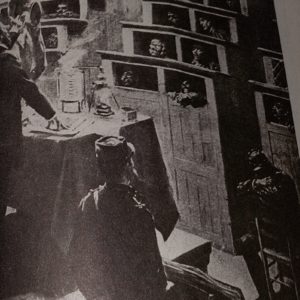“… One could then assume, that prison and the means of punishment in general are not intended for this, to suppress crime, but to differentiate them, to arrange them, to make them usable; that they should subdue those less, transcend the laws, but that they should appropriately organize the laws in a general tactic of submission. The criminal justice system would then be something like that “administration” of illegalities: she draws the limits of tolerance, gives freedom to violations, oppresses the others, excludes part of it, makes another usable, neutralizes one, gains from others. The criminal justice system would not simply suppress the illegality, but to differentiate them and ensure their general economy. And if one can speak of class justice, then not because of that, because the law or the judiciary serve the interests of a class, but because the classification of illegalities enforced by the judiciary supports mechanisms of domination. The legal penalties are part of the overall strategy of breaking the law.”
(Michel Foucault, Monitoring and Penalties, 1977, about the development of punishment structures in 19. century to “disciplinary society” … leider hat M.F. the “individual society” no longer experienced, would have been exciting, how he derives and traces back the punishment structures.)

